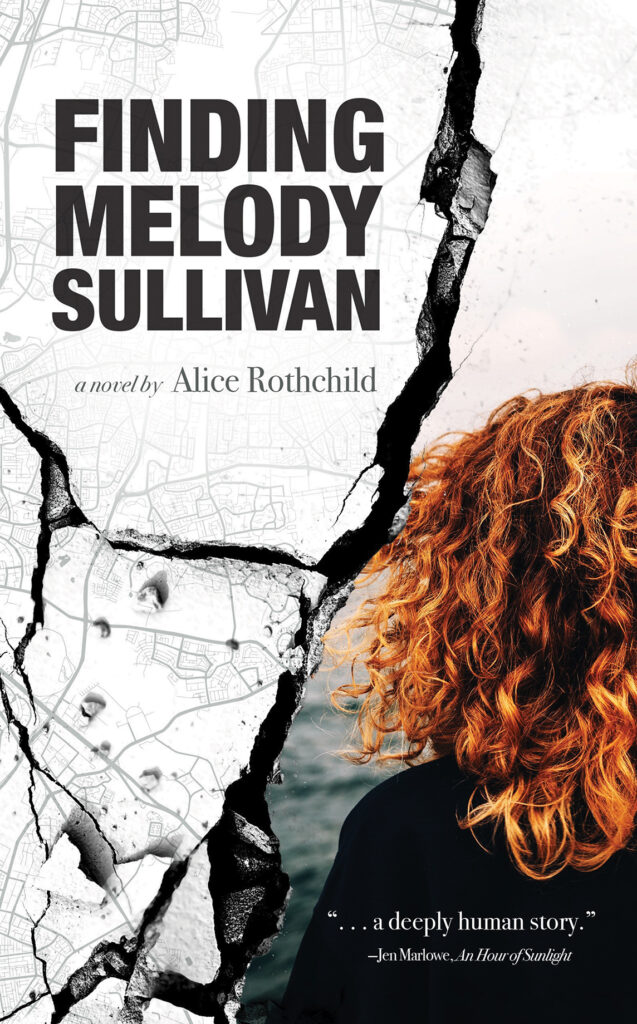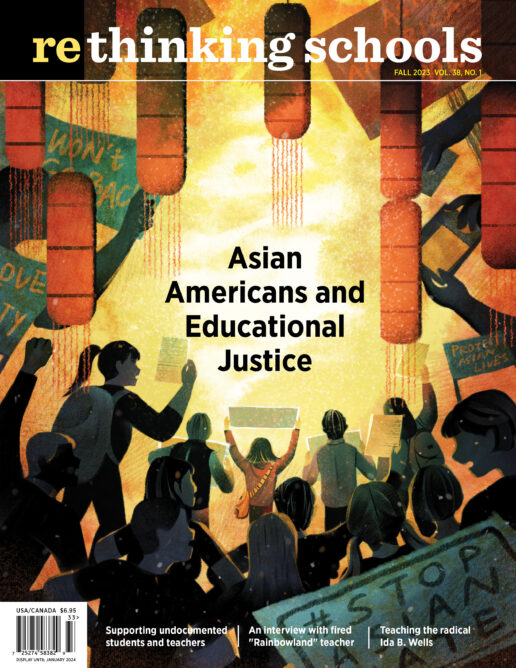Melody Sullivan Goes to Palestine

Book Review
Finding Melody Sullivan
By Alice Rothchild
(Cune Press, 2023)
192 pp.
Especially now, when support for Palestinians is being cast as anti-Semitism, it takes courage to write a YA novel about a U.S. teenager’s journey into Israel’s Occupied Territories of Palestine, and yet this is what Alice Rothchild does in Finding Melody Sullivan. It also takes courage — different kinds of courage — for her young protagonist, Melody (16), and her friends Yasmina (Yaz, 17) and Aaron (16), to face the full import of Israel’s harsh presence in these territories, occupied since the 1967 war. At stake for both Rothchild and her protagonists is a reality that most media hide.
Melody, Yaz, and Aaron grow up in a Vermont college town — a bubble of sorts, as politically liberal, atheist Melody says and as Muslim Palestinian American Yaz confirms. For each of them this pleasant college town offers only a semblance of protective comfort. Jewish American Aaron, ardently hoping to become a rabbi, looks to Israel’s settler Zionism as the only bulwark against a perpetually threatening anti-Semitism, while Yaz lives in constant awareness of the devastating effects of the Israeli occupation on Palestinian lives. Even for Melody, steeped in her “American” world and initially untouched by these issues, home is not a safe haven. Angry, depressed, and feeling abandoned by her mother’s death and her father’s emotional distance, she keeps touching a scar on her wrist — a reminder of a suicide attempt.
This Vermont interlude sets the stage for the book’s main action. We get to know Melody and her friends as typical kids who shoot basketballs and hang out at the local diner. This section spares readers advance knowledge of the challenges these young people are about to face, emphasizing their ordinary “American” life. The emphasis is on affinities as we hear Yaz’s “You go, girl” to Melody as they shoot basketballs and hear them both agree that bespectacled Aaron is a “dork.” Differences are just that, different, no big deal: “halal” vs. “kosher” food, Melody’s red curls (she’s Irish Israeli) under a baseball cap vs. Yaz’s dark curls tucked into in a hijab; Aaron’s religion vs. Melody’s atheism.
Yet all three find themselves tested during their summer break: Yaz visits her family in Hebron, notorious for settler and IDF anti-Palestinian violence; Melody, accompanying her archaeologist father to Jerusalem, is nearly raped and escapes to Yaz in Hebron; and Aaron, back in bucolic Vermont, learns hard facts about the occupation.
The ordinariness of their lives begins to fray as Melody encounters airport security on her way to Jerusalem. Unprepared, she has entered the war zone extending from post-9/11 United States to the Israeli-Palestinian “conflict” at the other end. This is not the adventure her father promised. Alone in Jerusalem while he is at meetings, Melody wanders through a bewildering maze of alleys, finds the Temple Mount blocked to visitors, and notes gender segregation at the Wailing Wall. In Tel Aviv she is almost raped by one of her cousin’s IDF buddies. When, desperate, she calls out to Yaz, it turns out that Yaz cannot come to support her.
Melody discovers why not when she decides to head for Hebron. This journey — the crossing into Israel’s Occupied Territories and a short three-days’ stay with Yaz’s family at the outskirts of Hebron — is the heart of the novel. Driving the five and a half miles from Jerusalem to Bethlehem, she could already see the roadblocks, the concrete guard towers, the massive separation wall, and the menacing soldiers. “It’s a fucking prison,” Melody thinks when she sees Palestinians menaced at a checkpoint. When Yaz’s uncle meets her on the other side, he detours to show her (at her request) the misery of refugee life and the unleashed IDF and settler violence that dominate life in Hebron. “Are those blindfolded kids? OMG!” she exclaims at the sight of teenage boys sitting cross-legged on the ground, blindfolded, their hands cuffed behind their back. And then “the deserted old market . . . shops all closed . . . rusted green awnings hanging above entries like tombstones.” Horrified, she sees a spray-painted Star of David on one door, “Gas the Arabs” on another. “Shit. Like Nazi Germany only backwards,” she thinks, clicking photos — documenting a Palestine whose very existence Aaron denies. Earlier, Aaron had asserted: “There is no such thing as Palestine.”
Melody never imagined she’d maneuver through a war zone when she embarked on this journey. The reality she is photographing along the way is a reality few Americans know. In this she is a stand-in for many of the book’s readers, adolescents like her (and likely their parents). But Aaron is also a stand-in. He speaks for those who believe that many Palestinians are terrorists and that the long-suffering Jews are merely reclaiming their own “promised” land, God-given as their rightful refuge. It is the dialogue between the reality Melody saw and Aaron’s skewed image of it that is the crux of the story, the place where readers are invited to come together. “You freaked him out, but in a good way,” Yaz says. “I’m sure he’ll think about everything. At his own pace.”
Alice Rothchild’s description of both the Occupation and Palestinian family life is painful but true to reality, and the novel’s ending even offers a measure of comfort. Melody’s welcome into Yaz’s large family is unqualified, with the food and laughter and warmth that speak of easy intimacy. Here Melody finds the life-affirming familial embrace she so desperately needs. When her father arrives to retrieve her, healing may be possible, perhaps: He, too, finds himself included in the familial welcome.
The book’s interweaving of personal and collective traumas is a powerful way to address readers. Beyond plot, it invites reflection on the ethics of the military politics that sustain the occupation. “How can you defend something if it means making lives miserable for the people who already live here?” Melody wonders. Aaron’s resistance finally collapses when he sees a photo of his own cousin, a settler, aiming his gun at a frightened Palestinian child. While casting a generic settler as Aaron’s cousin is contrived, the point is important: Blind support for the occupation is morally untenable. Similarly, although casting all Israeli Jews as callous brutes may feel contrived — there’s no mention of radical Jewish activists who struggle against the injustice of the occupation — the overarching point is well-taken: Passively as well as actively, all Israel’s Jewish citizens are implicated in the oppression of Palestinians.
Finding Melody Sullivan is a challenging novel, especially in the current climate when criticism of Israel is vilified as “anti-Semitism” and silenced by law. This is all the more reason to read and discuss it. That the book is also a page-turner, beautifully written, sensitive, and engaging, makes it also inviting. Framed in its teens’ ordinary life (e.g., Yaz’ college applications, Melody’s poetry), Finding Melody Sullivan ends with a measure of healing that eases readers into its consideration of nationalism, settler colonialism, and adolescent coming-of-age. These issues, it hints, are not disconnected from ones that preoccupy us locally: racism, gender, equity, and political engagement. Arguing for honest knowledge and ending on a note of resilience and good will, the book leaves us trusting in possibility.

